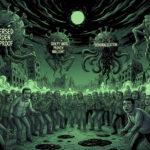
By seeking judgment from the world, you consent to its jurisdiction. Here’s how to withdraw that consent forever. *Note: It may be helpful to read my previous article first, Logos vs Worldly Ethos, Christ vs Anti-Christ, prior to reading this one, although it is not necessary. As rhetorical devices from Greek philosophy, ethos establishes credibility through authority and character, pathos persuades through emotional resonance, and logos convinces through an appeal to reason and objective truth. While a society […] Read more »













